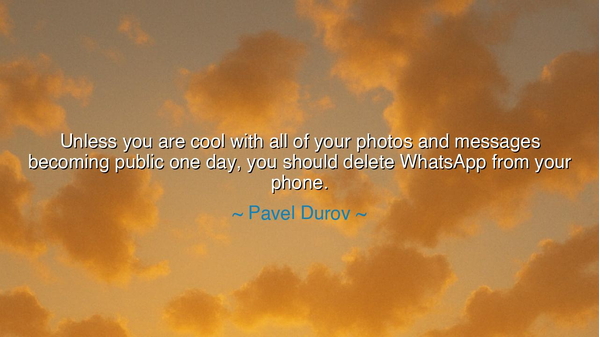
Unless you are cool with all of your photos and messages becoming
Unless you are cool with all of your photos and messages becoming public one day, you should delete WhatsApp from your phone.






"Unless you are cool with all of your photos and messages becoming public one day, you should delete WhatsApp from your phone." – Pavel Durov.
In this stark warning, Pavel Durov, the founder of Telegram, speaks to the evolving dangers of privacy in the modern digital age. He raises an unsettling truth: that what we send and share in private spaces—be it through messages or photos—could one day become public, whether by intentional means or through unforeseen circumstances. Durov’s quote reminds us that privacy, a right once deeply safeguarded in our societies, has become increasingly fragile in the digital age. His words urge us to reflect on the consequences of digital communication, recognizing that the information we share today may be used, misused, or exposed in the future.
The ancient philosophers often wrestled with the idea of personal integrity and the importance of maintaining honor in a world where our actions could be observed by others. Socrates, in particular, emphasized the alignment between one’s public and private selves. For Socrates, the act of leading a virtuous life was not only about being honest in public but about ensuring that one’s private actions were equally just. Durov’s warning aligns with this ancient wisdom: when we choose to participate in digital platforms, we are not simply interacting with a piece of technology; we are shaping our legacy, and the information we share may one day be used to define us, for better or worse.
Consider the story of Julius Caesar, whose famous "Veni, Vidi, Vici" (“I came, I saw, I conquered”) was not just a declaration of military success, but also a powerful statement about his mastery over public perception. Caesar understood the importance of publicity—his messages, whether in speeches or letters, were carefully curated to build his legacy and his image. In this way, his words, much like today’s digital communications, were crafted to be remembered, for they could, in time, become part of his immortalized identity. Much like Durov’s warning, Caesar understood that the things we put into the world—whether intentional or not—can have a far-reaching impact on our future reputation.
Similarly, the rise of public figures in the ancient world showed how easily personal lives could be exposed to the scrutiny of others. The Romans and Greeks, despite their complex systems of governance and their advancement in many fields, lived under the constant gaze of public opinion. Cicero, the great Roman orator, understood this intimately, for his speeches were not just political statements—they were also ways to carefully manage his personal legacy. His personal letters, much like today's digital messages, were often exposed to the public, and their contents played a role in shaping his reputation. Durov's quote serves as a modern-day reminder that we too are constantly creating a digital footprint that may outlive us, just as Cicero's writings still speak to us today.
The lesson from Pavel Durov’s warning is one of awareness and responsibility in the digital era. While we may believe that private conversations are just that—private—today’s digital tools have made it increasingly difficult to ensure true privacy. Whether through hacking, data breaches, or platforms that are less secure than we assume, our digital communications are far more vulnerable than we realize. Durov’s advice is not just about protecting ourselves from external threats, but also about fostering a deeper consciousness about the things we share. We must ask ourselves: if this message, image, or video were to become public, would we still stand by it? If not, then perhaps we need to reconsider what we choose to share.
Durov’s call to action is not just about protecting one’s privacy; it is about the ethics of the digital world. In the same way that ancient cultures placed a high value on personal integrity, we too must recognize that our digital actions should be guided by the same principles. The words we send, the photos we share, and the information we communicate define not only how others see us, but how we will be remembered. In an age where information can be preserved indefinitely, we must make choices that reflect our deepest values and our respect for privacy—both our own and others’.
In our own lives, we can take Durov’s insight as a lesson in mindfulness and prudence. Before sending that message or sharing that photo, ask yourself: "Would I be comfortable with this being made public?" This simple question can serve as a guideline for our actions in the digital world. We must strive to act with integrity, understanding that our digital footprint, much like the legacy of the ancients, will endure long after the moment has passed. Whether in our personal, professional, or social spheres, let us take responsibility for the digital marks we leave and consider the long-term implications of our actions in this ever-connected world. Privacy is a treasure, and protecting it requires a blend of wisdom, foresight, and respect for the future.






AAdministratorAdministrator
Welcome, honored guests. Please leave a comment, we will respond soon